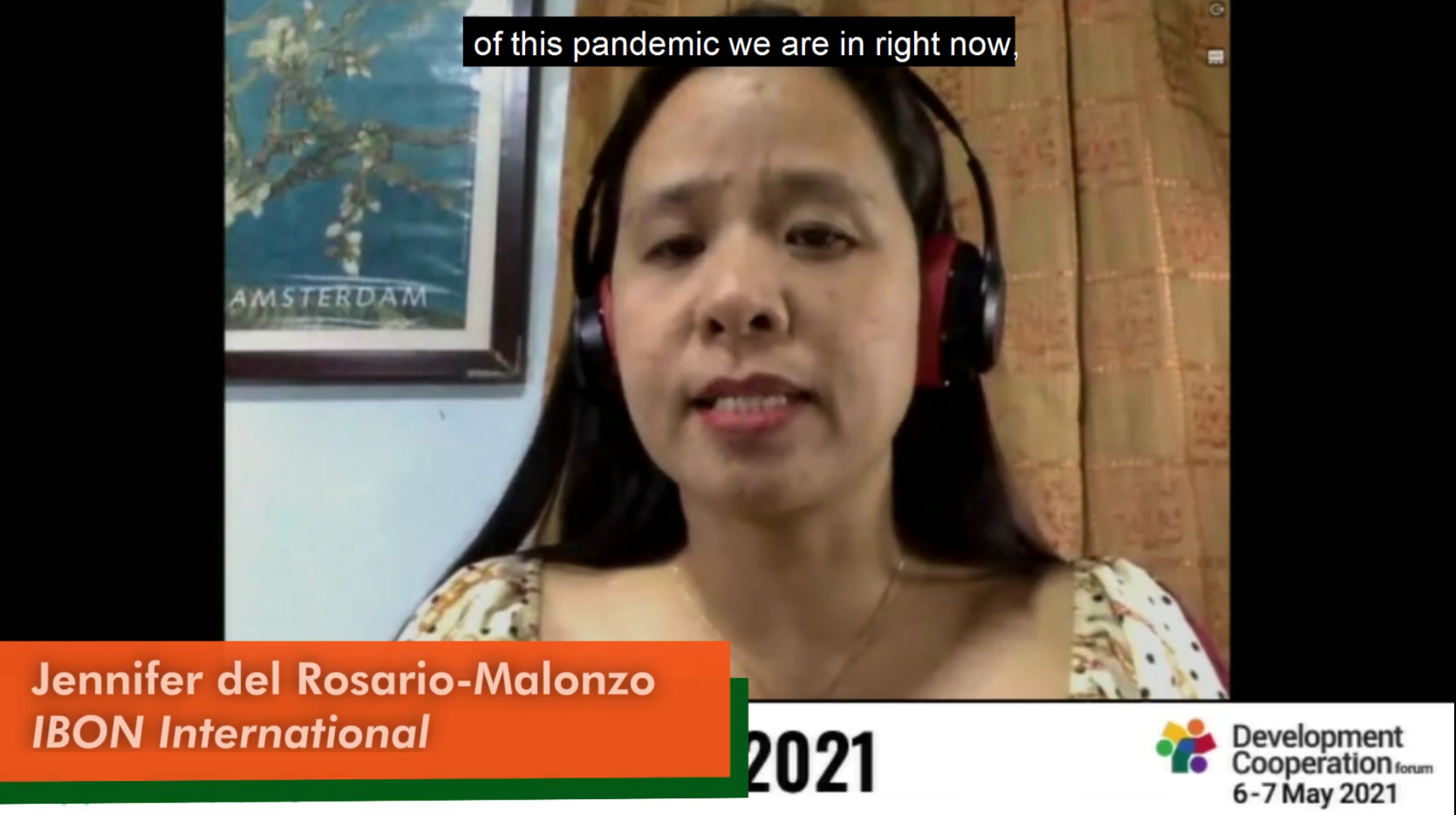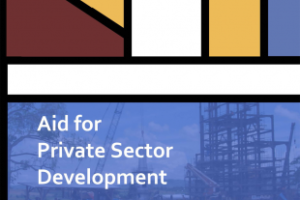IBON International Executive Director Jennifer del Rosario-Malonzo delivered the following intervention at a session on “Development cooperation in addressing the dual challenge of pandemic recovery and the climate emergency” at the 2021 High-level Meeting of the Development Cooperation Forum (DCF) last May 7. She asserted that developed countries need to exert political will to meet, and even exceed, their historical financing commitments for developing countries’ climate action and pandemic-era economic measures.
Thank you for this opportunity. I am Jennifer del Rosario-Malonzo, the Executive Director for IBON International. IBON International is a Southern international non-government organization that engages in capacity development for human rights and democracy around the world. We are part of the CSO Partnership for Development Effectiveness, the Reality of Aid Network, and the CSO Financing for Development Group.
Even prior to the pandemic, financing by developed countries for climate action in developing countries has been really insufficient and not geared towards meeting the goals of the Paris Agreement and Sendai Framework for Disaster Risk Reduction. Developed countries are not keeping to their promise to mobilise a “new and additional” USD 100 billion funding to help developing countries fight climate change through both adaptation and mitigation actions. And much of climate finance is still counted as official development assistance (ODA). Existing finance allocation trends are not reflective of the needs of frontline communities in the Global South. Allocations for mitigation dominate those for adaptation. Finance for disaster risk reduction is insufficient as shown by the severe impacts of extreme weather events across the world.
As governments tackle the exigencies of the pandemic, concerns are being raised about the ability to close the adaptation and disaster risk reduction financing gap. We think that climate finance would be affected by the redirection and reallocation of funding, as well as an overall reduction in funding. At the same time, we note that developed countries are more than willing to shell out billions of dollars to rescue the fossil fuel and aviation industries through generous stimulus packages and tax breaks.
There is incoherence in development cooperation providers’ Covid-19 policy responses and activities which risk locking developing countries in high-emission, carbon-intensive development paths. For example, a civil society review of the International Monetary Fund’s most recent economic policy advice found that the Fund could be implicitly endorsing fossil fuel subsidies by encouraging governments to increase public spending for infrastructure projects that include coal power plants.
For us in civil society, it is crucial to focus on key concerns when considering investments and capacities for resilient infrastructure. Aside from the quantity of investments, we should focus at the quality of development cooperation and financing.
The usual private finance-first modalities—from blended finance to public-private partnerships (PPPs)—are still being endorsed in relation to green infrastructure. But even the 2020 and 2021 Financing for Sustainable Development Reports have already pointed out that 1) the “development impact [of blending is] largely unknown”, and that 2) such deals focus on “bankability,” the quickest and maximum private returns, and not public welfare.
In conclusion, development cooperation for pandemic recovery should be supporting the broader goal of transforming economies to be low-carbon, equitable, rights-based, people-centred, and sustainable. Now more than ever, we should insist on the need for developed countries to fulfil their climate finance obligations to developing countries. Climate finance should also be matched by international responses to bolster national fiscal space, such as debt cancellations, fulfilling ODA commitments, progressive tax rules, among others.
The trillions of dollars being generated by developed countries to rescue their economies and for post-Covid19 stimulus packages show that if there is political will, there is additional finance for developing countries to adapt to climate change and manage the impacts and risks of climate disasters, move away from fossil fuels, and meet the sustainable development goals.
For approaches in development cooperation to tackle the climate emergency and address people’s needs in the global South, there needs to be coherence at the international and national levels, founded on principles of democratic ownership and inclusive partnerships, with people’s participation at the centre.Results must be founded on the rights of workers, farmers, Indigenous Peoples communities, and the transparency and accountability especially of duty-bearers. #




